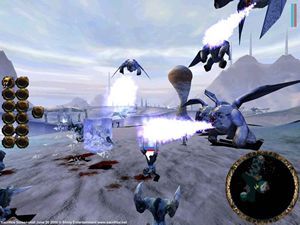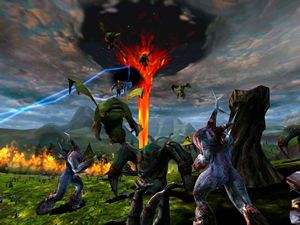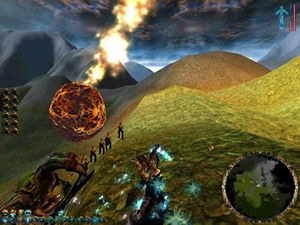What would you sacrifice?
When I first saw this game, it was about six months ago at a nerdy little
expo called the Game Developer’s Conference. The guy sitting in the booth showing
the demo was actually demonstrating some new 3D hardware and not the game itself.
“Yeah, yeah, yeah, 3D hardware.” I said to him, “Whatever. But what is that
game!?”
I had been stopped dead in my tracks by the game’s astonishing graphics (which
admittedly looked very good on whatever 3D hardware he was promoting). “It’s
called Sacrifice,” he said, “and it’s still a pre-alpha.” Well, alpha
or not, it impressed the hell out of me and I’ve been anxiously waiting for
the game ever since, ready to sacrifice my friends and loved ones as soon as
it arrived.
It’s now here in my grubby little paws and I am not disappointed. Sacrifice
is clever, innovative, deliciously creative, and just about the prettiest thing
I’ve ever seen. The graphics are simply astounding and remarkably scalable to
work on older systems. And with a newer system, especially with a G-Force 2
or Voodoo 5, your eyes will simply dance for joy. If it wore a bikini, I’d put
a poster of it in my garage.
On second thought, a bikini might not work so well. In Sacrifice you
play as a rogue wizard in a bizarre new land. Here, five gods are vying with
each other for power, and all seek your help. Placing any of these freaky-looking
wizards in a bikini would probably be a mistake, as few of them have any human
attributes. Fortunately, the gods are after your power, not your looks, and
it’s up to you to decide which one is offering what you want.
Like Clint Eastwood in For a Few Dollars More, or Toshiro Mifune in Yojimbo,
your services are much in demand, and you can change allegiances whenever you
wish, for money, power or morals (assuming you haven’t pissed off one of the
gods too much). This leads to one of the best, most complex mission structures
in video game history. The choices you make influence your powers, spells, creatures,
and ultimately the story itself, right down to the ending. Truly there is more
single player replay value here than in almost any other game.
Sacrifice most closely resembles a real time strategy game, but is in many ways something completely new. Everything is 3D and the camera follows your wizard around as you cast spells and order your units about, so no hopping around the map. Fortunately, you can summon new creatures right in front of you – assuming you have enough mana and an available soul or two.
Mana is generated by structures you build called manaliths, and then channeled
to you through your ‘manahoar’ creatures. Souls, on the other hand, are more
precious. To get a new soul, you need to take one from it’s current occupant
– you know, kill them. When you have killed an enemy creature, you can summon
one of your freaky ‘sac doctors’ who will take the soul back to your temple
where it will be sacrificed upon your altar and converted to your cause, to
do with as you will.
Since the total number of souls in the game remains constant, they are a very
precious commodity. Every soul you gain is one your enemy loses. While an interesting
system, it makes comebacks very difficult. It also encourages players to use
the Dark Side, i.e. hunker down and let your enemy stick his neck out first.
It is much easier to defend than attack in Sacrifice, and even harder
to grab those sweet, sweet souls.
 And you’ll
And you’ll
need every soul you can get to build your bizarre army. To describe the dozens
of creatures available as ‘imaginative’ would be an understatement. Trust me,
you’ve never seen stuff like this before. The more powerful creatures you can
summon will require more than one soul. Most of the creatures also have special
abilities you can activate in addition to ordering them around – guarding, attacking,
and using different formations.
And the spells, oh the spells! Depending on which god you serve and when, you’ll learn a different mix of the 50 or so spells in the game. From ‘lightning bolt’ and ‘heal’ to ‘rain of frogs’ and ‘volcano’, the spells are very, very impressive.
I’ve also got to mention the voice acting because it is simply fantastic. The gods, wizards and creatures have unique voices and comments, and they are all simply terrific. The musical score is great as well, and changes depending on which god’s realm you are in. Some people say they don’t really care about the sound, but those people are ignorant and Sacrifice proves it. They have simply never noticed how much the sound can effect the total, glorious experience of a game.
However, this much new gaming goodness comes at a price, a fee that is paid
in complexity. Sacrifice is a harsh mistress, and not for the timid or
casual gamer. Learning the complex controls will take quite a while, even with
the game’s three-part tutorial. During a battle you must order your creatures
about, support them with spells, and keep yourself alive, all while running
around and controlling the 3D camera. Things get so hectic, you almost never
actually get a chance to use each unit’s special ability. Many people will be
too frustrated to continue or too intimidated to start. This is really for fairly
hardcore gamers only, but if you are that brave gamer, oh, what an experience
it is.
So far I’ve sacrificed meals, sleep, nights out with my friends, work, and
money (for a new 3D card). If pressed, I’d also sacrifice a couple chickens
or a goat. So go get it now, and find out what you’ll be willing to put up on
the altar.

-
Beautiful, just beautiful
-
Dynamic plot
-
Unique and new
-
Fantastic sound
-
The Dark Side
-
Very, very complex







